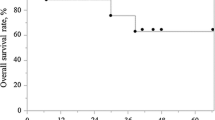Abstract
Percutaneous radiofrequency ablation (RFA) is a good indication for hepatocellular carcinoma (HCC) in cases involving ≦ 3 tumors of ≦ 30 mm in size, many hepatologists are hesitant to perform the procedure for patients with hemorrhagic disorders. We herein report the successful treatment of HCC by laparoscopic RFA in a patient with hemophilia A. A 48-year-old man with moderate form of hemophilia A had a single HCC at segment 8. To perform laparoscopic RFA safely, recombinant factor VIII (rFVIII) was administered to maintain factor VIII activity (FVIII:C) > 80% on the operation day and > 40% for 6 days after the operation in accordance with the guidelines. A total of 23,000 units of rFVIII was used. Laparoscopic RFA was completed with an operation time of 105 min and < 10 mL of blood loss. As a result, blood transfusion was not required. At 2 years after the initial treatment, HCC recurred at segment 7. Under rFVIII supplementation, we performed a second laparoscopic RFA without any events. Although partial hepatectomy is the main procedure used to treat HCC in patients with hemophilia, we could reduce in total use of rFVIII, blood and operation time by laparoscopic RFA compared with those in partial hepatectomy.



Similar content being viewed by others
References
Darby SC, Ewart DW, Giangrande PLF, et al. Mortality from liver cancer and liver disease in haemophilic men and boys in UK given blood products contaminated with hepatitis C. Lancet. 1997;350:1425–31.
Xu Q, Kobayashi S, Ye X, et al. Comparison of hepatic resection and radiofrequency ablation for small hepatocellular carcinoma: a meta-analysis of 16,103 patients. Sci Rep. 2014;4:1–9.
Meijer K, Haagsma EB. HCV-related liver cancer in people with haemophilia. Haemophilia. 2012;18:17–24.
Morimoto N, Isoda N, Takaoka Y, et al. Short-term results of laparoscopic radiofrequency ablation using a multipolar system for localized hepatocellular carcinoma. Liver Cancer. 2017;6:137–45.
Takaoka Y, Morimoto N, Miura K, et al. A successful treatment for hepatocellular carcinoma with Osler–Rendu–Weber disease using radiofrequency ablation under laparoscopy. Clin J Gastroenterol. 2018;11:501–6.
Yanabu N, Mori K, Wada Y, et al. Hepatic resection in a patient with hemophilia A—a protocol for supplementation of factor VIII concentrate. Jpn J Gastroenterol Surg. 1993;26:2832–5.
Dzik WH, Laposata M, Hertl M, Sandberg WS, Chatterji M, Misdraji J. Case 38-2008: a 58-year-old man with hemophilia, hepatocellular carcinoma, and intractable bleeding. N Engl J Med. 2008;359:2587–97.
Morimoto N, Isoda N, Watanabe S, et al. Evaluation of bleeding from needle tract in laparoscopic bipolar radiofrequency ablation. Kanzo. 2015;56:306–8.
Minami Y, Hayaishi S, Kudo M. Radiofrequency ablation for hepatic malignancies: is needle tract cauterization necessary for preventing iatrogenic bleeding? Dig Dis. 2013;31:480–4.
Takamatsu J, Kamiya T, Saito H. Successful resection of hepatocellular carcinoma found in a patient with anti-HCV antibody positive hemophilia A. Japanese Journal of Transfusion Medicine. 1992;38:548–53.
Shen SC, Harada A, Kurokawa T, et al. Partial hepatectomy for hepatocellular carcinoma in a patient with hemophilia: a case report. Hepatogastroenterology. 1994;41:283–6.
Kawashima K, Ishiyama S, Narushima Y, et al. A case of hepatocellular carcinoma in a patient with hemophilia A associated with human immunodeficiency virus infection. J Jpn Surg Assoc. 2005;64:421–5.
Narushima Y, Ishiyama S, Kawashima K, et al. Operated hepatocellular carcinoma in two HIV- and HCV-positive hemophilic patients. J Hepatobiliary Pancreat Surg. 2004;11:207–10.
Koga C, Shirabe K, Nagaie T. Partial hepatectomy in a patient with hemophilia a under supplementation of factor VIII concentrate: a case report. J Jpn College Surg. 2008;33:648–52.
Jones AE, Roy A, Armstrong T, et al. Successful liver surgery in a haemophilia patient with high titre factor VIII inhibitor. Haemophilia. 2009;15:1332–3.
Uchino K, Tateishi R, Nakagawa H, et al. Uninodular combined hepatocellular and cholangiocarcinoma with multiple non-neoplastic hypervascular lesions appearing in the liver of a patient with HIV and HCV coinfection. J Clin Virol. 2013;57:173–7.
Inokawa Y, Sugimoto H, Kanda M, et al. Hepatectomy for hepatocellular carcinoma in patients with hemophilia. J Hepatobiliary Pancreat Sci. 2014;21:824–8.
Kobayashi K, Kokudo T, Yamaguchi T, et al. Hepatectomy in patients with inherited blood coagulation disorders can be safely performed with adequate coagulation factor replacement. Haemophilia. 2019;25:463–7.
Tan HY, Gong JF, Yu F, et al. Long-term efficacy of laparoscopic radiofrequency ablation in early hepatocellular carcinoma: a systematic review and meta-analysis. J Laparoendosc Adv Surg Tech A. 2019;29:770–9.
Author information
Authors and Affiliations
Corresponding author
Ethics declarations
Conflict of interest
Tsukasa Ohmori received research supports from Mitsubishi-Tanabe and lecture fees from Novonordisk pharma. Both fees are outside of the study. Other authors (Rie Goka, Naoki Morimoto, Kouichi Miura, Shunji Watanabe, Yoshinari Takaoka, Hiroaki Nomoto, Mamiko Tsukui, Takeshi Fujieda, Hiroshi Maeda, Naoto Sato, Norio Isoda, Hironori Yamamoto) have no conflict of interest.
Human rights
All procedures followed have been performed in accordance with the ethical standards laid down in the 1964 Declaration of Helsinki and its later amendments.
Informed consent
Informed consent was obtained from the patient for being included in the study.
Additional information
Publisher's Note
Springer Nature remains neutral with regard to jurisdictional claims in published maps and institutional affiliations.
Rights and permissions
About this article
Cite this article
Goka, R., Morimoto, N., Miura, K. et al. Successful treatment of hepatocellular carcinoma by laparoscopic radiofrequency ablation in a patient with hemophilia A. Clin J Gastroenterol 13, 907–913 (2020). https://doi.org/10.1007/s12328-020-01133-4
Received:
Accepted:
Published:
Issue Date:
DOI: https://doi.org/10.1007/s12328-020-01133-4




